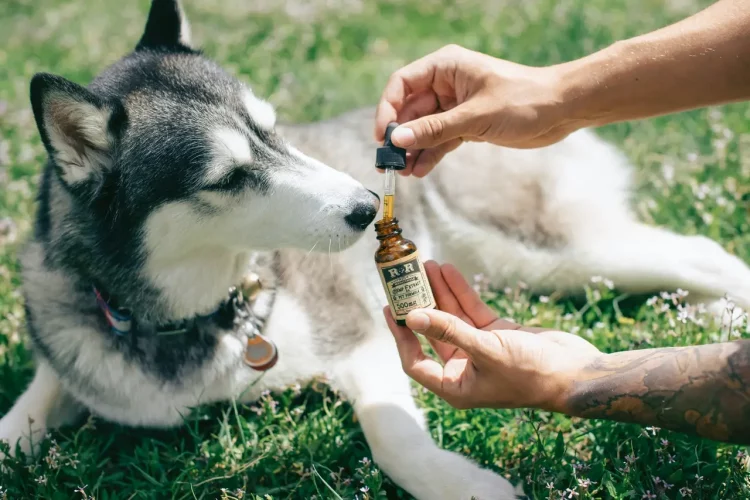The health-enhancing effects of hemp oil are not restricted to humans; dogs have also experienced the same advantages. Multiple studies have demonstrated the extraordinary benefits of this plant. This post is for you if you are ignorant of how CBD oil for dog allergies relieves your dog’s minor ailments and discomfort.
The issue of allergic reactions is not limited to humans. Even dogs are susceptible to allergies, which cause symptoms such as itching, pain, and swelling. You may notice the agony and misery that your dog is experiencing, causing great distress.
Could CBD Oil Help Allergic Dogs?
The majority of allergy reactions are inflammatory reactions. Many characteristics of allergic inflammation are similar to those of inflammation caused by immunological responses to illness or things like insect stings—allergies “trick” the immune system into reacting to chemicals that would typically not affect the body.
When the body recognizes an allergen, the immune system generates inflammation, which increases blood flow and transports immune components to the affected area. As a result, the spot grows hotter, redder, and swollen, which, depending on the intensity and location of the allergy, can range from slightly irritating to life-threatening.
CBD has been demonstrated to decrease inflammation effectively. CBD can down-regulate over-reactive immune cells and improve the body’s ability to maintain homeostasis in response to external threats and infections by interacting with cannabinoid receptors across the endocannabinoid systemrr
Can my dog get allergic to CBD oil?
Indeed they can. Dogs and humans alike can be allergic to any organic or chemical material; therefore, it’s always vital to take caution when introducing new compounds to your dog. Our dosing guidance suggests beginning with approximately 0.2mg of CBD per pound of body weight.
If your dog develops a reaction to CBD, it will likely present differently depending on the route of administration. CBD used orally may result in diarrhea, nausea, or a dry mouth. It is more likely that an allergy to topically applied CBD will induce itching or a rash.
CBD oil for seasonal allergies
In dogs, skin allergies are more prevalent than respiratory allergies, although this does not mean that respiratory allergies do not exist. Like humans, canines can develop respiratory reactions to dust or mould in the home and seasonal reactions to pollen outside. If this is the case, expect sneezing, wheezing, and/or drainage from the eyes or nose.
Like seasonal allergy medications, CBD can inhibit the release of histamines by acting on Mast cells in the immune system. Consequently, allergens should have a diminished influence on your dog’s respiration. Additionally, CBD oil for dogs may assist in decongesting sinuses and relieving pressure in nasal canals.
If your dog is continually exposed to allergens, a daily dose of CBD is likely the most effective way to gain these benefits. You can drop oil directly into your dog’s mouth, apply it to a treat, or use pre-infused treats to help build up histamine-inhibiting cannabinoids in his body. If your dog’s mouth is inflamed, CBD directly to the gums with a CBD oil tincture should significantly reduce inflammation.
CBD oil for allergic skin
Flea allergy dermatitis (FAD) and other forms of skin irritation are the most common allergens for dogs. CBD used topically can be a highly effective treatment for itching, inflammation, and irritation in this context. Applying the oil straight to the reaction site circumvents the digestive system and metabolism (unlike antihistamine medicines), which boosts absorption and enables CBD to remain in the affected area for an extended amount of time.
CBD can also be helpful as a treatment for one-time or infrequent skin allergies, such as those caused by bee stings. CBD is unlikely to affect a dog’s allergies, but it can assist in soothing painful, irritated stings and help anxious canines relax.
How Can CBD Oil Be Given to Dogs?
CBD oil administration to dogs is relatively straightforward. Since most CBD is so dense, the flavor is hardly detectable. The easiest method is to conceal it in their food or treats! Your dog will not even be aware that they are receiving medication. You can also offer your dog a CBD product that has been sweetened to attract their attention. This should make it extremely easy to give them anything to aid with their dog allergies.
Advantages of using CBD oil to treat dog allergies
CBD oil is one of the widely used natural dog supplements (and people). The tendency is not just due to marketing hype. Hundreds of studies have previously been published on the therapeutic effects of cannabis-based medicines. CBD oil, also known as cannabidiol, has been the subject of numerous studies centered on skin health.
Let’s examine the science behind CBD oil, a home remedy for itchy skin that functions both internally and externally.
- Due to its unique relationship with the endocannabinoid system, which is present in all animals, dog owners and veterinarians are using CBD as an alternative treatment for dog allergies.
- CBD is thought to have anti-inflammatory properties, which may aid in the reduction of swelling, irritation, and pain associated with dermatitis and skin allergies.
- CBD’s anti-inflammatory benefits have been examined in mice, rats, and dogs, among other species.
- CBD was administered to dogs with atopic dermatitis in a big study, with positive results.
- CBD is not, however, a panacea for dog allergies. Before administering CBD oil to their pets, owners should see a veterinarian.
- CBD oil helps their agony and relaxes them, even if they suffer from allergies. It may be feasible to alleviate allergy symptoms by focusing on the dog’s immunological response.
- CBD oil is being studied as a treatment for canine gastrointestinal disorders. This important communication network supports the brain-gut axis, which promotes gut motility and supports the function of the central nervous system in defensive and metabolic activities.
Possible CBD Adverse Effects on Dogs
Although there are no scientific studies on the side effects of CBD use in dogs, there may be potential side effects based on how CBD affects humans. To reduce the likelihood of side effects, adhere to the prescribed dosage.
- Dry mouth: According to research, CBD can reduce saliva production. This might manifest as increased thirst in dogs.
- Decreased blood pressure: It has been shown that high dosages of CBD cause a temporary decrease in blood pressure. Even though the dip is minor, it may cause a momentary feeling of dizziness.
- Drowsiness: CBD can be used by dog owners to address anxiety. CBD’s soothing impact can also induce mild sleepiness, especially at higher doses.
CBD Merchandise on the Market
When purchasing CBD oil for your dog, there are a few considerations to bear in mind if you and your veterinarian decide to attempt CBD as a treatment. CBD oil of high grade will have a greater probability of being effective than low-quality CBD oil.
- Search for organic products. If CBD oil is not organic, it should at least be free of pesticides, fungicides, and solvents.
- Do not shop solely primarily on pricing. Generally, more excellent quality and purity are accompanied by a higher price. A less expensive choice may contain toxins like pesticides, herbicides, or heavy metals. Ensure that your CBD oil contains no additives.
- Obtain an analysis. The manufacturer must give a certificate attesting to the CBD content of the product. Numerous CBD products contain only trace levels of the compound. You will also want to ensure that the product has minimal or no THC.
- Purchase CBD liquid. You can purchase CBD-containing dog treats, but oil or tincture is the most effective administration method. Thus, the dosage can be adjusted drop by drop.
Frequently Asked Questions About CBD Oil For Dogs:
CBD is useful for alleviating allergy symptoms, such as itching, irritation, and pain. Several allergic problems, including asthma, may be alleviated with CBD oil.
Yes, CBD oil usage may reduce inflammation and itchiness of the skin. Inflammation can generate dilated blood vessels and elevated cytokines, which can cause itching. Luckily, hemp oil may inhibit this process.
There are hundreds of chemicals in a cannabis plant, including THC and CBD. The portions of the cannabis spectrum used to create cannabis oil are comparable to the cannabinoid spectrum naturally found in the human body. As CBD isolate has no psychotropic substances, it is safe for dogs.
Yes, CBD oil can trigger an allergic reaction in your dog. The most common adverse reactions to CBD include diarrhea, dry mouth, dizziness, nausea, and tiredness. Consult your veterinarian if you have any of these symptoms.
Conclusion
Multiple studies have demonstrated CBD’s effectiveness in decreasing pain and inflammation. It is considered a novel class of medications to alleviate chronic pain by scientists. Due to its ability to reduce inflammatory cytokines, hemp oil helps reduce chronic inflammation and pain in your dog. Overall, CBD is a healthy oil that has numerous applications.















